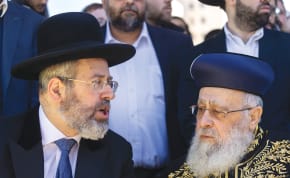Readers of The Jerusalem Post have their say.
The 150 Assembly members are composed of 80 Rabbis, who are always men by virtue of their position, and 70 heads of local authorities and religious councils, of which few are women.
Accusations of nepotism within Israel's rabbinate intensify amid upcoming elections. This practice, seen in key appointments, raises concerns about fairness and transparency.
The Rabbinical Committee withdraws Rabbi Meir Kahane as the Religious Zionist candidate for Chief Ashkenazi Rabbi, reopening the race for the position.
The 100 mayors who wrote the letter to the Religious Affairs Minister were specifically expressing their opposition to a series of directives published by the Religious Affairs ministry on April 11.
Conflict arose within the government after the coalition announced that it would proceed with a bill proposal that Gantz and Sa'ar vetoed.
Today, there is a strong sense that if people want to leave, they should go -- no one is keeping them here.
The High Court of Justice ruling is significant in that it is a critical recognition of women’s education, knowledge, and integration into the sphere of Torah and Halacha.
The impact of the decision is yet to be seen: it does not mandate, but merely permits, the inclusion of women to be considered for the committee that selects Chief Rabbis and Chief Rabbinate Council.
To preserve the sanctity of those murdered by Hamas, for the first time since the establishment of the state, they decided to bury the vehicles.












